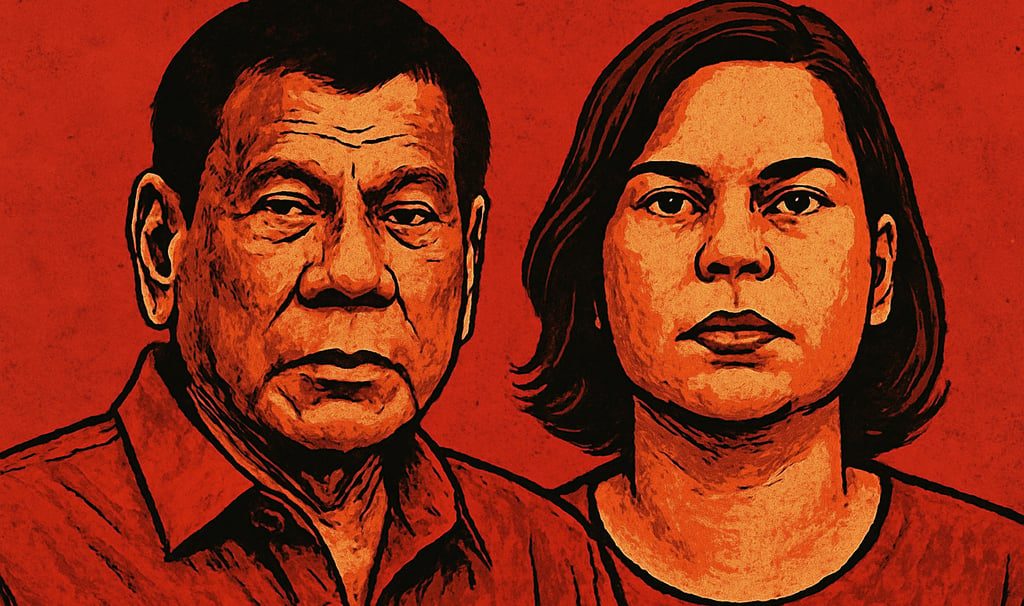What Is the Joint BPI Account Between Rodrigo and Sara That They Don’t Want Investigated?
This post takes a closer look at the Joint BPI Account Between Rodrigo and Sara—the one that’s been quietly whispered about for years, but never properly investigated. Backed by documents, whistleblower accounts, and confirmed reports, this blog lays out what we know so far, why it matters, and why so many are going out of their way to shut the investigation down.


My daughter got invited to a debut tonight. Nothing fancy, just one of those sweet 18 celebrations we all grew up attending. After I dropped her off, I found myself driving home with the usual quiet hum of traffic and my thoughts—until I opened YouTube and played an episode of Facts First. Former senator Sonny Trillanes was speaking, and right in the middle of his commentary, he brought up something that made me sit up: the alleged joint BPI account of Rodrigo Duterte and his daughter Sara.
I’ve heard whispers about this account before, but Trillanes sounded so confident. So sure of the numbers. So sure of the source. And that got me thinking—where exactly is he getting all this? Are there documents? Names? Dates?
I reached home and, like clockwork, curiosity got the better of me. I did what I always do when something itches at my gut—I started digging.
And here’s what I found.
The BPI Joint Account: What We Know
At the center of all this noise is a joint account at the Bank of the Philippine Islands (BPI), Julia Vargas branch. The account number: 002433-0695-39. And the account holders? Rodrigo Roa Duterte and his daughter, Sara Z. Duterte. One is the former president and longtime mayor of Davao. The other, also a former mayor of Davao, and currently the vice president and his political successor.
But it’s not the names that spark suspicion—it’s the money that moved through it.
From 2006 to 2015, this account reportedly saw over P2.2 billion in total flows. The most glaring deposit happened on March 28, 2014—Duterte’s 69th birthday. On that day alone, the account allegedly received P193,705,615.88 via seven separate deposits:
P55,131,747.32
P41,721,035.62
Four deposits of P20,000,000 each
And P16,852,832.94
Who deposits that much money on someone’s birthday? And in that many separate chunks? The level of precision in those numbers isn’t random. It’s structured. Calculated. Raises questions about whether these were gifts, structured payments, or something more sinister.
Then there’s Sammy Uy—a businessman identified by whistleblower Arturo Lascañas as a drug lord. Uy reportedly gave the Dutertes P134 million in manager’s checks. But that’s just a portion. According to former Senator Antonio Trillanes IV, Uy’s total transfers from 2007 to 2015 to Duterte-linked accounts add up to P2.4 billion (VERA Files).
Let’s be real. Public officials aren't supposed to have that kind of cash flowing into personal accounts. Not even close.
The Smoking Gun: Why This Account Is a Big Deal
This isn’t just some exaggerated exposé. It’s a legal red flag.
Under Republic Act 6713 (Code of Conduct and Ethical Standards for Public Officials), every public official must declare all assets, liabilities, and yes—bank deposits—in their annual SALN (Statement of Assets, Liabilities, and Net Worth). But according to reports by VERA Files, from 2011 to 2015, these massive joint deposits weren’t declared (VERA Files). Some years saw over P100 million unaccounted for.
And this isn’t just some clerical slip. We’re talking about a culpable violation of the Constitution, which is grounds for impeachment. For comparison, Chief Justice Renato Corona was ousted in 2012 for failing to declare far smaller bank accounts.
If these numbers check out, we’re looking at a textbook case of unexplained wealth, which falls under the Anti-Graft and Corrupt Practices Act (RA 3019) and even the Anti-Money Laundering Act.
Add in the fact that the money may have come from individuals tied to illegal activity, and it starts to look like bribery, corruption, and possible laundering of illicit funds. This isn’t just a political issue anymore. It’s a legal time bomb.
The Fear Factor: Why Supporters Keep Shutting It Down
Now we get to the bigger question: Why are Duterte supporters so hell-bent on keeping this account from being investigated?
Legal and Political Stakes
Let’s start with the obvious—legal exposure. If the account is officially opened and the records match what’s been reported, it could lead to criminal charges, impeachment, and asset forfeiture. That kind of fallout doesn’t stop with just two people. It could unravel a whole web of money, power, and quiet transactions stretching across the Duterte circle.
Then there’s the image. For years, the Duterte brand has been tied to a no-nonsense, incorruptible persona. If it turns out that billions in dirty money were hidden under their name, that image is gone. With the 2028 elections inching closer, Sara Duterte’s chances would take a serious hit. From frontrunner to liability in one headline.
Obstruction Tactics
The moves to block the investigation are now playing out in plain sight.
Senate President Chiz Escudero has been accused of slowing down Sara’s impeachment trial—delaying proceedings and kicking the issue down the calendar (Rappler) (VERA Files). Senator Bato dela Rosa’s office floated technical dismissals, banking on time and bureaucracy to bury the case.
And Rodrigo Duterte? He still refuses to sign a bank secrecy waiver. He promised to. He backed out. During a November 2024 House hearing, he claimed the account was with his wife, not Sara—a claim that was eventually debunked (Philstar) (VERA Files). These tactics suggest a coordinated effort to keep the account—and its secrets—out of public view.
How the Truth Slipped Through: Trillanes and the Whistleblowers
Back in 2016, Senator Antonio Trillanes IV dropped the first bombshell. He said a “concerned citizen” named Joseph de Mesa gave him over 40 pages of BPI records, supposedly from someone with access to investigations into ill-gotten wealth.
The Duterte camp’s first defense? Deny and discredit. They called de Mesa a fictional character.
But that strategy crumbled when the Office of the Ombudsman and the Anti-Money Laundering Council (AMLC) stepped in. In 2017, Overall Deputy Ombudsman Arthur Carandang confirmed that the documents matched transaction records from AMLC (Office of the Ombudsman) (VERA Files).
AMLC denied leaking anything, but they didn’t deny the content. The validation from Carandang was key. It proved the documents weren’t fake—they reflected actual bank activity (Philippine Daily Inquirer) (VERA Files).
What this suggests is that Trillanes had help from a network of insiders—possibly within government agencies, banks, or law enforcement. He wasn’t pulling numbers out of thin air. And he wasn’t alone.
Later, opposition figures like Leila de Lima joined in. The pieces began forming a pattern—a slow but steady outline of financial dealings that couldn’t easily be dismissed as fake news.
What happened next? Carandang was suspended for three months after confirming the records (ABS-CBN News) (VERA Files). The message was clear: those who challenge the Duterte dynasty do so at their own peril.
When Journalists Tried It Themselves
It didn’t stop with whistleblowers. Back in 2016, even journalists and political opponents decided to test if the account was real—by putting actual money in it.
Mar Roxas' camp deposited ₱500 into the alleged BPI Julia Vargas account. The bank accepted it. The deposit slip was shown to the media (VERA Files).
The Philippine Daily Inquirer’s research team also tried it—this time, ₱100. Same result. It went through (Philippine Daily Inquirer).
Some Duterte supporters, even those trying to prove the account was fake, tried sending ₱5. The transaction didn’t bounce (Ellen Tordesillas).
None of these people had joint access, authorization, or insider connections. They just walked into a branch, filled out a deposit slip, and watched the money go through. So if the account didn’t exist—as Duterte once claimed—how were they able to deposit into it?
The Cover-Up vs. the Public
Despite every effort to bury this, the public isn’t buying it.
A Social Weather Stations survey showed that 88% of Filipinos want Sara Duterte to face the impeachment process and defend herself (SWS) (VERA Files). That’s not a fringe opinion—that’s the overwhelming majority of the country saying, “Let the truth come out.”
The House of Representatives has already asked AMLC to formally investigate the account (Rappler) (VERA Files). AMLC has denied leaking anything, but acknowledged that they received the request. The Senate, on the other hand, is stuck. Duterte allies are using every trick in the book to stall, delay, and distract.
This isn’t just about one bank account. It’s a test of our democratic institutions. Either they function—or they fold under the weight of influence.
What’s at Stake for All of Us
This goes way beyond the Dutertes.
The BPI joint account case is really about whether the Philippines can break free from its pattern of impunity. Whether those in power can be held accountable—or whether the system will, once again, protect them at all costs.
Right now, Rodrigo Duterte is facing trial in The Hague for crimes against humanity (International Criminal Court) (VERA Files). Sara Duterte is facing impeachment. The dynasty is vulnerable. And if this case is pursued seriously, it could send a ripple effect through every level of government.
But let’s not be naïve. The system they built is vast and deeply entrenched. And it’s fighting back—through legal delays, procedural blocks, and quiet threats.
Still, for everyday Filipinos, this moment matters. Because if this investigation succeeds, it won’t just be about consequences for the Dutertes—it could be the start of something we’ve waited a long time to see: public service that actually answers to the public.
Closing Thoughts: When Curiosity Becomes a Civic Duty
So yes, my curiosity kicked in after a late-night drive from a debut. And what started as a casual listen to a senator on YouTube spiraled into hours of reading, cross-checking, and putting pieces together.
What I found was a story that’s bigger than politics. It’s about the ongoing battle between silence and truth. Between power and accountability. Between what we’re told—and what we eventually uncover for ourselves.
The billions. The suspicious timing. The ties to alleged criminal figures. The cover-ups. It’s all there.
And maybe, just maybe, this is why they don’t want us looking.
But the truth doesn’t vanish just because people refuse to open the door.
So we ask. We read. We remember. Because this isn’t just about a joint bank account—it’s about what kind of country we’re willing to fight for. The stakes couldn’t be higher.
Contact us
subscribe to morning coffee thoughts today!
inquiry@morningcoffeethoughts.org
© 2024. All rights reserved.
If Morning Coffee Thoughts adds value to your day, you can support it with a monthly subscription.
You can also send your donation via Gcash: 0969 314 4839.
